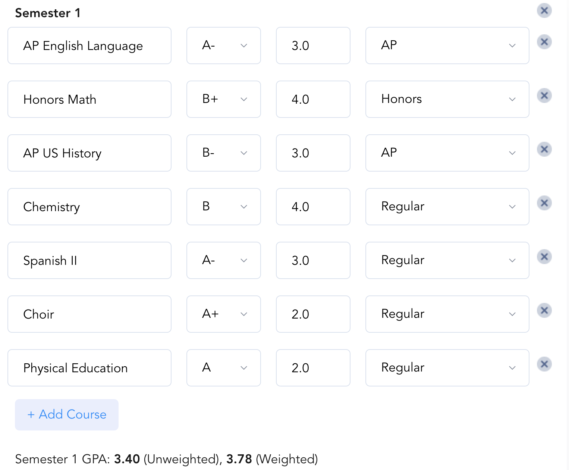How to Calculate Your GPA: Use This Calculator and Guide
Your grade point average (GPA) is a metric colleges use to evaluate the rigor of your curriculum and compare you to your peers in the admissions process. Many schools calculate GPAs differently, so it can be difficult to understand where you fall in comparison to other candidates.
Use our GPA calculator to discover your GPA. In this article, we’ll break down how GPAs are calculated and give you tips on how to think about your own GPA. If know your GPA already but need to convert it to a 4.0 scale, use our GPA converter.
GPA Calculator
Use this GPA calculator to better understand how your GPA works and how you could impact it. To get started, make sure you have your most recent transcript in front of you or a list of all your classes. You’ll need the course name, grade, credits, and course type to use the calculator.
How to Use the GPA Calculator
To get started, you’ll need a copy of your most recent high school transcript. On it, you should find:
- The list of classes you have taken
- Your grade for each
- Every course’s credit value (Not all schools have this, but check to be sure. If your school doesn’t issue credits, you can simply input “1” for each course.)
Each of these factors is important when it comes to calculating GPA. Keep in mind that our calculator follows the most common set of rules for calculating GPA, but your school may do things a little differently.
Classes
The courses you have taken matter because they indicate the level of rigor that you pursued while in high school. The number of Honors and AP/IB courses that you have taken factors into your GPA calculation.
Grades
Your grades let admissions officers know how well you did in your courses. While every school is a little different, typically grade values break down as follows:
| For a letter grade… | The average percentage on assignments is… | And the grade point value is… |
| A+ | 97-100% | 4.0 |
| A | 93-96% | 4.0 |
| A- | 90-92% | 3.7 |
| B+ | 87-89% | 3.3 |
| B | 83-86% | 3.0 |
| B- | 80-82% | 2.7 |
| C+ | 77-79% | 2.3 |
| C | 73-76% | 2.0 |
| C- | 70-72% | 1.7 |
| D+ | 67-69% | 1.3 |
| D | 65-66% | 1.0 |
| F | Below 65% | 0.0 |
Credits
Each course should have a credit value between 1 and 5. Credits are a way to indicate the importance of a course. Core academic courses, such as English and Mathematics, are given a higher value, usually a 3 or a 4. Non-core academic courses, like Art or Foreign Language, as well as non-academic courses like Gym receive lower credit values.
For our GPA Calculator, enter:
- The name of each class
- Your grade for each class
- Each class’s credit value. (Use “1” as a placeholder if your school does not use credits.)
- Select the course type from our drop-down menu.
Here is an example of what one semester’s worth of grades may look like in CollegeVine’s GPA Calculator.

If you want to check our math, simply…
1. Multiply the grade point for each class by its credit value.
2. Sum the values.
3. Divide the total by your total number of course credits.
4. Round to the hundredth’s place.
The result will give you your unweighted GPA.
What’s the Difference Between a Weighted and Unweighted GPA?
Your unweighted GPA is an average of all your grades without taking into account the rigor of the associated courses. For example, a B in AP U.S. History is the same as a B in regular History according to this scale. A weighted GPA adds credit for more rigorous courses.
Typically AP, IB Higher Level, and college courses receive a +1.0-point boost when calculating GPA. Similarly, Honors, IB Standard Level, and Dual Enrollment classes give a +0.5-point boost to the student’s GPA. Only by taking these more rigorous courses can a student earn a GPA above the standard 4.0 value.
To calculate your weighted GPA, use our calculator or…
1. Add the following points to your original values AND then multiply the grade point for each class by its credit value.
- 0.0 for regular and ACP courses.
- 0.5 for Honors, IB SL, and dual enrollment courses.
- 1.0 for AP, post-AP, IB HL, and college courses.
2. Sum the values.
3. Divide the total by your total number of course credits.
4. Round to the hundredth’s place.
How Do I Know Which GPA Scale My School Uses? What If It’s Different from This One?
Ask your school counselor how your high school calculates GPA. A lot of the time, there will be small (or even substantial) variations from this standard approach.
Don’t worry! Colleges receive information on how your school weights grades. The admissions officer evaluating your file has extensive training on how to put your GPA in context.
You can still use our GPA calculator to figure out what your GPA would be on a traditional scale. Use the table and example above to approximate grade point values and credit values for each of the courses you have taken so far. For example:
- Any Math or Lab Science course likely is worth 4.0 credits
- Any Non-Lab Science, English or Social Studies course likely is worth 3.0 credits
- All other courses likely are worth 2.0 credits
- Any class with an overall percentage in the 90s is likely an A
- Any class with an overall percentage in the 80s is likely a B, and so on
What if My School Practices Grade Inflation or Grade Deflation?
Grade inflation has been a major source of concern since the early 2000s, when numerous journalists broke the story that students were graduating with higher GPAs than historically had been seen.
It’s true that some schools are generous with grading to make their students stand out during application season. By contrast, other schools purposefully give low grades to build their reputation for rigor.
Regardless of how your school deals with grades, do not spend that much time thinking about its implications for your GPA. Admissions officers receive annual school reports from each applicant’s school, and usually these reports include a write-up on the school’s grading philosophy. It’s the admissions officer’s job to put your application in context. Your only responsibility is to do as well as you can at the school you attend.
Where Else Can I Use My GPA Besides on College Applications?
Your grades matter for more than getting into college. Strong grades reflect a certain level of intelligence, maturity, and capacity to plan ahead. You don’t have to wait until you are a high school senior to start cashing in on the benefits of a good academic reputation.
If you are applying for a job or internship, you can include your GPA on your resume. Just make sure it’s a number you are proud of before you share it with employers. Typically anything higher than a 3.2 should do the trick, but more prestigious employers may expect a 4.0 weighted GPA or higher.
Many independent scholarships also take your GPA into account. You can learn more about CollegeVine’s favorite awards by visiting our Scholarships page.
Last but not least, if you drive, your grades may make you eligible for lower rates of auto insurance. Send customer support a copy of your transcript to see if your insurance provider will lower your payments.
How Important Is My GPA?
This is one of the questions we receive most often, and giving a good answer is tricky. On the one hand, your GPA is probably the single most important metric that appears on your college application. Schools want to accept academically strong students, so it’s critical to keep your GPA high.
On the other hand, GPA is an imperfect metric, and colleges understand that. Here are just a few questions your GPA can’t answer:
- What is this student’s background?
- Do they have the maturity to succeed in college?
- Is this student a good person?
- Would people on campus want to spend time with them?
- How hard does this student work?
- What is this student’s passion?
- Has this student’s academic performance improved or declined over time?
- Would this student have done as well or better at another school?
- What kind of thinker are they?
- Who will this student be in ten years?
There is so much more to assembling a successful college application than merely boosting your GPA. Colleges will review your academic profile in a more holistic way that accounts for your curriculum rigor, the difficulty of your high school, how you performed against your classmates, and key aspects of your background and personality. Ultimately, your GPA is only one part of a much bigger picture.
Want to know how your GPA impacts your chances of acceptance to your dream schools? Our free Chancing Engine will not only help you predict your odds, but also let you know how you stack up against other applicants, and which aspects of your profile to improve. Sign up for your free CollegeVine account today to gain access to our Chancing Engine and get a jumpstart on your college strategy!

